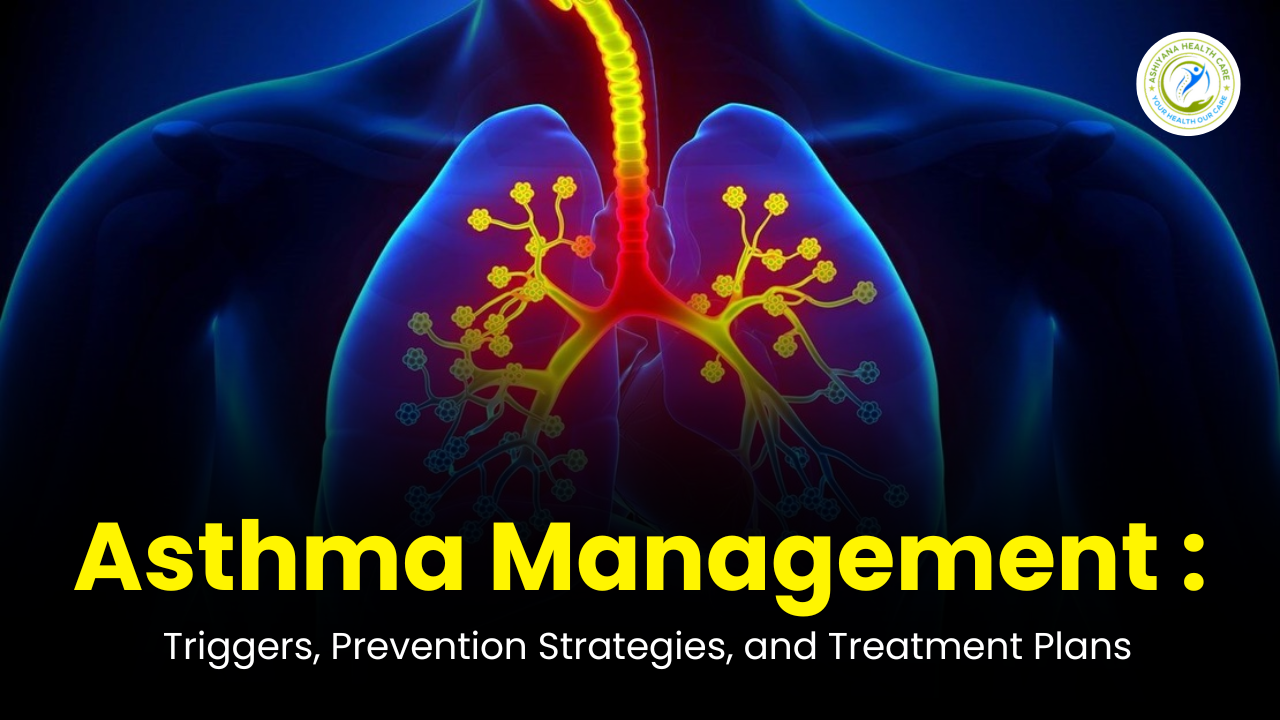
Asthma Management: Triggers, Prevention Strategies, and Treatment Plans
Introduction
Asthma is a chronic respiratory condition that affects millions of people worldwide, causing breathing difficulties due to inflammation and narrowing of the airways. It can be triggered by various environmental and genetic factors, making effective management essential for leading a healthy life. Understanding asthma triggers, prevention strategies, and available treatments can help individuals control their symptoms and improve their quality of life.
What is Asthma?
Asthma is a condition where the airways become inflamed, producing excess mucus and tightening due to muscle contractions. This leads to difficulty in breathing, wheezing, and coughing. While asthma is not curable, it can be managed effectively with proper treatment and lifestyle adjustments.
Common Triggers of Asthma
Asthma attacks can be triggered by several factors, including:
1. Allergens
- Dust mites, pollen, pet dander, mold, and cockroach droppings can trigger asthma symptoms.
2. Environmental Irritants
- Exposure to smoke, strong odors, pollution, and chemicals can cause airway inflammation.
3. Respiratory Infections
- Common colds, flu, and sinus infections often worsen asthma symptoms.
4. Physical Activity
- Strenuous exercise, especially in cold or dry air, can induce asthma attacks in some individuals.
5. Weather Changes
- Cold air, humidity, and extreme temperature shifts can lead to breathing difficulties.
6. Stress and Anxiety
- Emotional stress and anxiety can trigger asthma symptoms by affecting breathing patterns.
Prevention Strategies for Asthma
Managing asthma involves avoiding triggers and making lifestyle changes. Here are some key preventive measures:
1. Identify and Avoid Triggers
- Keeping a symptom diary can help identify specific triggers and take preventive actions.
2. Maintain Indoor Air Quality
- Use air purifiers, vacuum regularly, and ensure proper ventilation to reduce allergens.
3. Stay Active with Caution
- Engage in low-impact exercises such as walking, swimming, or yoga to improve lung function without triggering symptoms.
4. Follow a Healthy Diet
- A well-balanced diet rich in fruits, vegetables, and omega-3 fatty acids can support lung health.
5. Manage Stress Effectively
- Practices like meditation, deep breathing, and mindfulness can help reduce asthma-related stress.
Treatment Plans for Asthma
The goal of asthma treatment is to control symptoms and prevent flare-ups. Treatment plans include medications and long-term management strategies.
1. Quick-Relief Medications (Rescue Inhalers)
- Short-Acting Beta-Agonists (SABAs): Help relax airway muscles for immediate relief during an asthma attack.
- Anticholinergics: Reduce mucus production and widen airways.
2. Long-Term Control Medications
- Inhaled Corticosteroids: Reduce inflammation and prevent asthma symptoms.
- Leukotriene Modifiers: Help control asthma by blocking certain immune system chemicals.
- Long-Acting Beta-Agonists (LABAs): Used in combination with inhaled steroids for persistent asthma.
3. Allergy Management
- Allergy Shots (Immunotherapy): Gradually desensitize the immune system to allergens.
- Antihistamines and Decongestants: Help control allergic reactions that trigger asthma.
4. Emergency Treatment for Severe Attacks
- Nebulizer Therapy: Delivers medication in mist form for fast absorption.
- Oxygen Therapy: Provides additional oxygen during severe attacks.
- Hospitalization: In critical cases, patients may need intensive care and mechanical ventilation.
Lifestyle Modifications for Better Asthma Control
To ensure long-term asthma control, consider the following:
1. Monitor Symptoms Regularly
- Keep a peak flow meter to track lung function and detect early signs of worsening asthma.
2. Take Medications as Prescribed
- Adhering to the treatment plan reduces the risk of sudden asthma attacks.
3. Vaccination and Regular Check-Ups
- Get flu shots and pneumonia vaccines to prevent respiratory infections.
- Regular doctor visits help in monitoring and adjusting treatment if needed.
When to See a Doctor
Seek medical attention if:
- Symptoms worsen despite medication.
- There is difficulty speaking or performing daily activities.
- Wheezing and breathlessness increase significantly.
Conclusion
Asthma is a manageable condition with the right approach to triggers, prevention, and treatment. Early diagnosis, lifestyle adjustments, and adherence to medical advice can help individuals lead a normal, active life. If you experience frequent breathing difficulties, consult Ashiyana Healthcare for expert guidance and personalized asthma management plans.
0 Comments on Healthy environment...